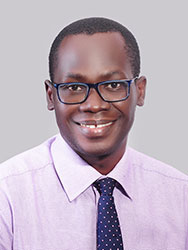Innovating advanced care for Ugandan patients with rheumatic heart disease
May / June 2021 | Volume 20 Number 3
Q and A with Emmy Okello, M.D., Ph.D., FACC
 Emmy Okello, M.D., Ph.D., FACC
Emmy Okello, M.D., Ph.D., FACC
Dr. Emmy Okello is chief of cardiology at the Uganda Heart Institute and honorary associate professor at Makerere University. Okello graduated from Mbarara University School of Medicine and earned his Ph.D. from Makerere University. He received advanced training at Case Western Reserve University through a fellowship of the Medical Education Partnership Initiative (MEPI) - managed by Fogarty and funded by PEPFAR, the NIH Common Fund and the National Heart, Lung and Blood Institute. In recognition of his rheumatic heart disease research, Okello was named a Fellow of the American College of Cardiology.
Why cardiology?
In low-income settings, we’re seeing an epidemiological transition to more coronary heart disease. Ugandans who are not exposed to high-income lifestyles are now presenting with heart attacks. This didn’t happen 20 years ago. Why? Is it diet? High sugar levels? Our economy is weak and cannot sustain an epidemic of heart disease, so the answer lies in prevention. Yet, to prevent, we must first understand what is causing this shift. Is it the traditional risk factors for coronary heart disease as described in the West? Or is there something unique to our environment - is infection contributing to coronary heart disease? This is what I’m working to discover.
Tell us about rheumatic heart disease.
Rheumatic heart disease (RHD), which afflicts 40 million people worldwide, begins with a childhood sore throat. Most of the time, sore throats are triggered by viral illnesses, but 3 out of 10 times it is caused by strep A bacteria, which can result in streptococcal pharyngitis. In some people, that causes the body’s immunity to act against itself, resulting in a febrile illness called acute rheumatic fever (ARF). Now, if you’re in the tropics, fever could mean malaria or other febrile illnesses, so ARF is often missed or confused with something else. Yet, if you identify rheumatic fever, you can treat and stop it - an antibiotic and aspirin is usually all it takes. Unfortunately, if this stage is missed, the disease progresses and years later, as young adults, these patients show up in the hospital with full-blown rheumatic heart disease, usually with heart failure due to irreversible damage to their heart valves.
My Ph.D. research focused on the burden, risk factors and outcome of RHD in Uganda, where the prevalence is about 3% yet only 1-2% know their status. With 70% of Uganda’s 40 million population below the age of 35, RHD is an epidemic we cannot afford to manage. Our study also found 17% mortality, a result of late diagnosis when surgery is either impossible or unaffordable. Our focus now is on an early phase of RHD called latent RHD, where the heart valve damage is still potentially reversible.
How did MEPI advance your career?
During my fellowship years, I was supported to conduct the first study of genetic susceptibility to RHD in Uganda. I also received advanced training in the U.S. at Case Western Reserve University in interventional cardiology. I focused on systems management that helped me grow as a scientific leader and advance as an early-career researcher. Peer-to-peer support was another part of the program and I continue to assist and promote faculty researchers at Makerere and the Uganda Heart Institute as a way to continue building research capacity in Uganda.
When I went to Case Western, the culture was different, the medical system was different. Every day I was forced to think in new ways. It was life-changing! I learned how to run high-tech services, properly and under a lot of pressure, while delivering quality. When I came back, sometimes it was a little overwhelming because I knew how much needed to be done - back in Cleveland, everything ran like clockwork. Still, that became the motivation; I wanted to be part of the solution. For doctors from developing nations it is very important to see a system running properly. It changes your mindset and helps you understand that things can change. Even one month of exposure makes a difference.
What advice do you offer mentees?
Collaborate! Sometimes all you need is one colleague in a high-income country and another within your own country and from there you can build. It will take time to establish trust, to understand each other’s capacities and mutual interests. Eventually, though, you get to the point where you can apply together for grants and become part of studies implemented across the globe. In collaborations, we researchers from LMICs can contribute our reverse innovations and share our knowledge of diseases the current generation of HIC doctors do not know. We have questions about certain diseases that may be unique to our environment and sharing will be of mutual benefit. There’s so much opportunity to work together in a sustainable, respectful way.
More Information
To view Adobe PDF files,
download current, free accessible plug-ins from Adobe's website.
Related Fogarty Programs
Related World Regions / Countries